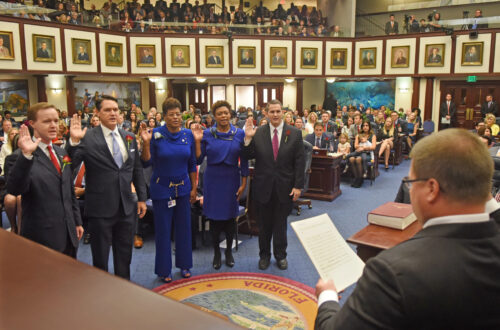Following the insurrection at the nation’s Capitol, a number of Republican legislators from Florida opposed at least one of the state’s Electoral College results, an action the Walt Disney Company found indefensible and reason to halt donations to such lawmakers.
Among those who opposed the certification is Florida Sen. Rick Scott (R), one of seven senators to object to Pennsylvania’s election results. Florida’s other senator, Marco Rubio (R), voted to accept the results.
In the House, several central Florida Congress members, including Rep. Dan Webster (R-Clermont) Rep. Bill Posey (R-Rockledge), Rep. Kat Cammack (R-Ocala) and Rep. Scott Franklin (R-Lakeland) opposed election results. In total, 139 representatives voted to object. Of these 139 representatives, 12 were Republicans from Florida.
Disney said in a statement that in the “immediate aftermath of that appalling siege, members of Congress had an opportunity to unite – an opportunity that some sadly refused to embrace. In light of these events, we have decided we will not make political contributions in 2021 to lawmakers who voted to reject the certification of the Electoral College votes.”
In 2015, Walt Disney Parks and Resorts donated a quarter of a million dollars to Scott’s Let’s Get to Work political action committee while he was governor. Let’s Get to Work served as the independent PAC funding Scott’s 2014 re-election campaign for governor. Disney appears on the Let’s Get to Work political campaign contributions list twice: once in 2015 and again in 2017.
As of now, none of the aforementioned Florida lawmakers will receive financial contributions from Disney. How long this policy will last is unknown.
Disney’s promise to halt donations to Florida lawmakers such as Scott proposes a possible decrease in large sums of future campaign funding. Along with Disney, Walmart Inc., AT&T Inc., Amazon.com Inc. and Mastercard Inc. announced similar directives regarding donations. General Motors Co. joined firms such as JPMorgan Chase & Co., Alphabet Inc. and Union Pacific Corp. in pausing contributions to all members of Congress, not just those who opposed Biden’s certification.
Although corporations are not legally allowed to donate money to candidates out of corporate funds, it is legal for them to pay the expenses of a PAC. Corporations have had two main channels for donations: contributions collected and distributed by corporate PACs and contributions made by individual corporate officers.
Disney’s past PAC contributions convey the importance of corporations in funding political campaigns.
The impact of Disney’s decision to stop donations to those who opposed the 2020 electoral certification is unclear at the moment. A pause in donations is not a permanent condition.
The corporations’ suspensions occur within the first quarter following a presidential election, a normally light fundraising period. Impacts on election and re-election campaigns will depend on whether or not corporations like Disney adhere to their new contribution approach throughout 2021 and into the 2022 Senate races.
Major U.S. corporations like Disney and their decisions to halt contributions to all congressional Republicans who objected to Biden’s Electoral College victory could put lawmakers like Scott in a difficult spot. On Jan. 11, Scott took over the GOP’s Senate campaign fundraising arm, but the question remains – will corporate America contribute?
Featured image: Cinderella’s Castle at Walt Disney’s Magic Kingdom. Unmodified photo by Michael Gray used under a Creative Commons license. (https://bit.ly/391PvHd)
Check out other recent articles from the Florida Political Review here.





